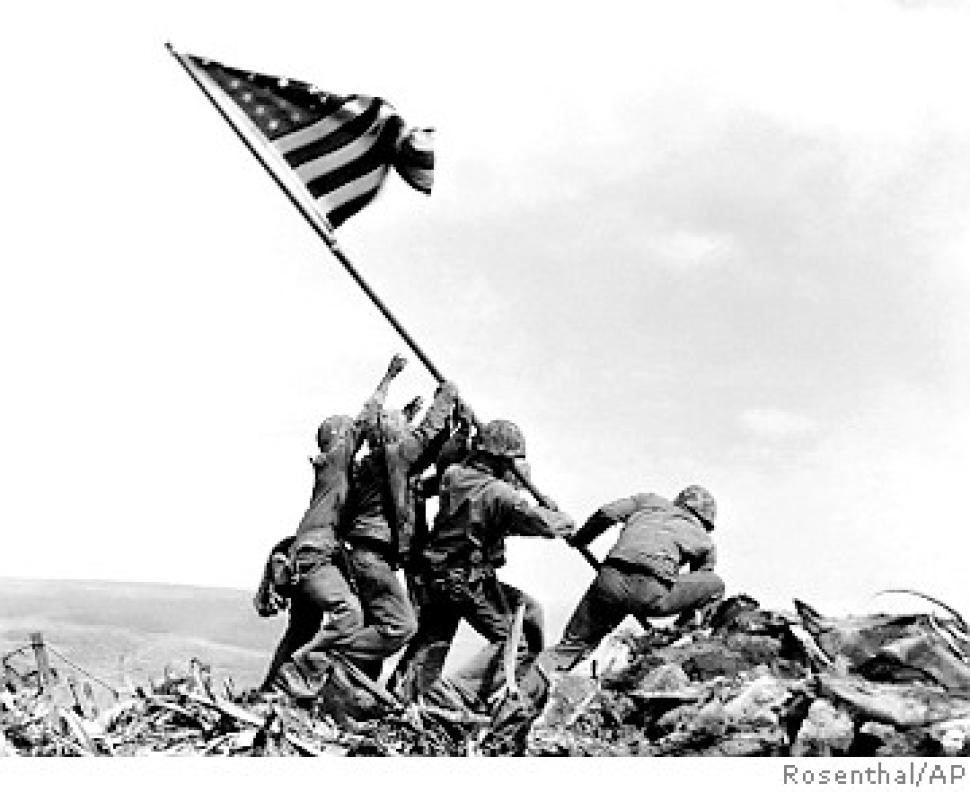
On February 23, 1945, less than six months before the end of World War II, U.S. Marines fought their way to the top of Mt. Suribachi on the tiny volcanic atoll of Iwo Jima.
AP photographer Joe Rosenthal clambered up the slopes behind them, hoping to take a picture of the raising of the American flag.
He was too late. By the time he arrived, the Stars and Stripes were already flying, signaling that the hill’s Japanese defenders had been overrun.
A Marine colonel, however, ordered that the first flag be lowered so it could be preserved for posterity, and that a replacement flag be raised in its place. Rosenthal, given a second chance, grabbed his bulky camera and pointed it toward the six Marines maneuvering the pole.
He snapped a series of pictures without even looking into his viewfinder. Until they were developed, he didn’t actually know if he had captured the action.
Pictures 9 and 11 were ruined by over-exposure. But picture 10 was crystal clear. “Here’s one for all time,” said the photo editor who first saw Rosenthal’s now iconic image. It went on to win a Pulitzer Prize and is rightly regarded as one of history’s most famous photographic representations of war.
The Battle of Iwo Jima didn’t end with the flag-raising. Intense combat raged for five more weeks. Ultimately 6,821 American soldiers lost their lives – the only time in history that the U.S. Marine Corps has suffered more casualties than it inflicted. Rosenthal said, “The picture is a miracle. No man who survived that beach can tell you how he did it.”
Three of the men in the picture lost their lives within days of the flag-raising. The other three returned home and became national celebrities – a role that none of them embraced.
Ira Hayes, at the far left, was a native American from Arizona. Hayes was one of only 27 of his company of 250 who walked off the island unscathed. Overwhelmed, he died an alcoholic at age 32.
In his bestseller Flags of Our Fathers, James Bradley – son of John Bradley, who is barely visible on the far side of the group and who lived until 1994 – recounts that his third grade teacher told him, “Your father is a hero.”
Bradley later said: “When I went home and told my dad that, he looked at me and said, ‘I want you always to remember that the heroes of Iwo Jima are the guys who did not come back.”
A hero is someone who raises our energy to keep doing what is right. What should be our response to the actions of six young men in a 76-year-old picture?
Be grateful to those 20-year-olds, whose stunning courage shaped history – your history and mine.
Resolve not to live a trivial life – that is, one in which we chiefly settle for meeting our own needs. We only get one shot at this.
Imitate their courage. Be brave today. Speak the truth, stand up for the weak, and go the extra mile to help someone else.
“Therefore, since we are surrounded by so great a cloud of witnesses, let us also lay aside every weight and the sin that clings so closely, and let us run with perseverance the race that is set before us, looking to Jesus the pioneer and perfecter of our faith, who for the sake of the joy that was set before him endured the cross, disregarding its shame, and has taken his seat at the right hand of the throne of God.” (Hebrews 12:1-2)
Just because we don’t have to storm a heavily defended hill this Memorial Day doesn’t mean we’re not characters in God’s greatest drama.
